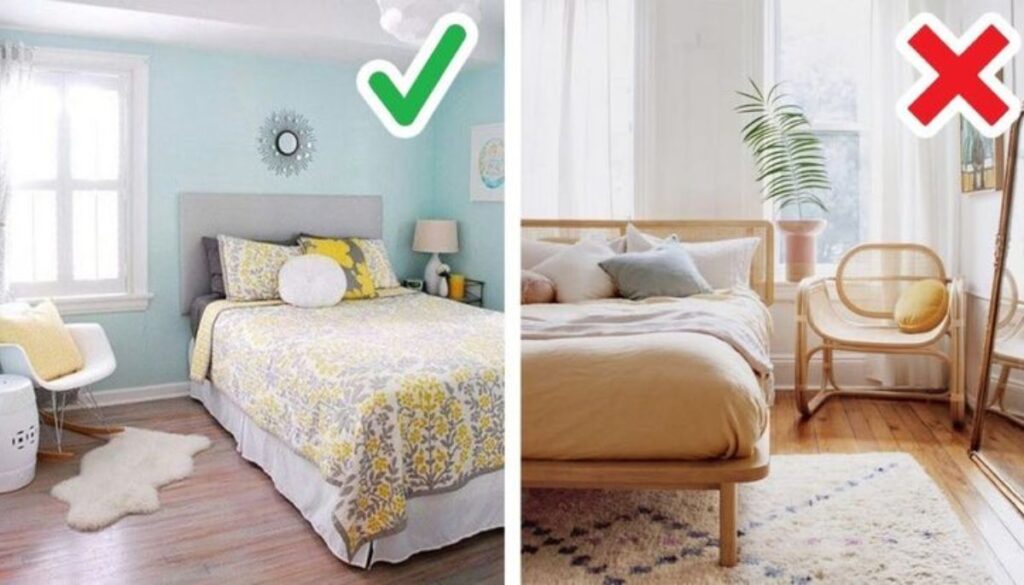Your bedroom should be a relaxing sanctuary where you can escape the stresses of the day. However, many bedrooms are cluttered, uncomfortable spaces that feel anything but peaceful. Follow these 10 genius hacks to transform your bedroom into a soothing, tranquil oasis perfect for drifting off into deep, restful sleep.
Declutter
Clutter is one of the biggest obstacles to a serene bedroom. It visually distracts and can make spaces feel smaller. Dedicate an afternoon to completely decluttering your bedroom—clear off surfaces, organize piles into storage bins, toss anything you don’t need. Store most belongings in closets or dressers so your sleeping space stays tidy. Limit knickknacks and accessories too.
Purify Air
Freshen your bedroom’s atmosphere and air quality with strategically placed houseplants like snake plants, aloe vera, and English ivy which naturally purify air. Diffusing essential oils like lavender, chamomile, and cedarwood also cleanses air while creating a soothing aroma. Install an air purifier to reduce allergens. Open windows regularly to circulate fresh air too.
Soft Fabrics
Upgrade your bedding, curtains, carpet and other fabrics to super soft, high quality materials that delight the senses. Splurge on silky soft high thread count sheets, a plush duvet insert, cozy textured throw blankets, and cushy pillows. Swap thick drapes for breezy linen or cotton curtains. Fluffy rugs over cold flooring feel divine underfoot.
Muted Color Palette
Bright, bold colors and patterns tend to feel too stimulating for relaxing bedrooms. Instead, decorate using muted neutral tones like cream, gray, and beige as your base. Then layer in subtle pastel accent colors like powder blue or lavender for visual interest. Don’t forget varied textures and natural elements too.
Minimize Light
Excessive light can make it challenging to feel sleepy and wind down. Opt for room darkening shades and blackout curtains to block outside light from windows completely. Dim your electronic devices at night and avoid bright overhead lighting. Use table and floor lamps on dimmers to provide a warm glow as needed.
Soundproof
External noises like traffic, neighbors, and a noisy household can disrupt sleep. Upgrade your windows to noise reducing panes. Hang sound dampening curtains and rug your floors to muffle sounds. Run a white noise machine, small fountain, or quiet music to mask unwanted noise interference and promote better sleep.
Adjust Temperature
The ideal bedroom temperature for quality rest is around 65°F. This cool yet comfortable environment stimulates melatonin production. Make sure your mattress and bedding provide adequate warmth and insulation. Install ceiling fans to circulate air. Use a space heater or central heating to take off the chill in winter.
Limit Electronics
The stimulating blue light and EMF emissions from electronic devices impede restful sleep. Don’t watch TV or use laptops, phones, and tablets in your bedroom. Banish alarm clocks and other gadgets too. Read a paper book or write in a journal before bed instead of scrolling screens. Charge devices outside the room.
Soothing Scents
Fill your bedroom with calming aromas through scented candles, essential oil diffusers, resting dried lavender under your pillow, or fresh flowers on the nightstand. Light, clean scents like eucalyptus, lemon, and green tea refresh. Floral and herb notes like chamomile and lavender induce relaxation. Avoid stimulating scents before bedtime.
Clear Your Mind
Racing thoughts and mental clutter can prevent you from unwinding. Develop a relaxing pre-bedtime routine like journaling, meditating, or doing light stretches to decompress. Jot down a to-do list to clear your mind of any nagging tasks. Let go of the day’s worries and make peace with turning in for the night. A relaxed brain means better sleep.
Conclusion
Transforming your bedroom into a sleep-inducing sanctuary requires decluttering, purifying the air, using soft fabrics, neutral décor, minimized light, soundproofing, proper temperature, limiting electronics, soothing scents and clearing your mind. Following these bedroom hacks will soon have you drifting off into deep, restorative sleep in your relaxing new oasis. Don’t underestimate the power and necessity of quality sleep for health, happiness and wellbeing.
FAQs
What temperature should a bedroom be for sleeping?
The ideal bedroom temperature for sleep is around 65°F. This cool yet comfy environment helps stimulate melatonin release for better rest.
What plants purify air quality in bedrooms?
Snake plants, aloe vera, English ivy, peace lilies and spider plants naturally filter indoor air pollutants and freshen stuffy rooms.
Should I use blackout curtains in my bedroom?
Blackout curtains or blinds that fully block light are ideal for bedrooms. This allows complete darkness for improved melatonin release.
How can I soundproof my bedroom?
Install noise-reducing windows and curtains, put down area rugs, run white noise machines, and avoid making noise after bedtime.
What essential oils are relaxing for the bedroom?
Lavender, chamomile, cedarwood, clary sage, sweet marjoram and valerian essential oils promote relaxation and sleep before bed.
